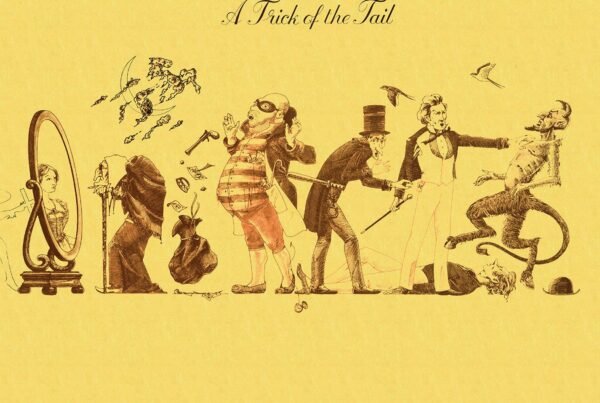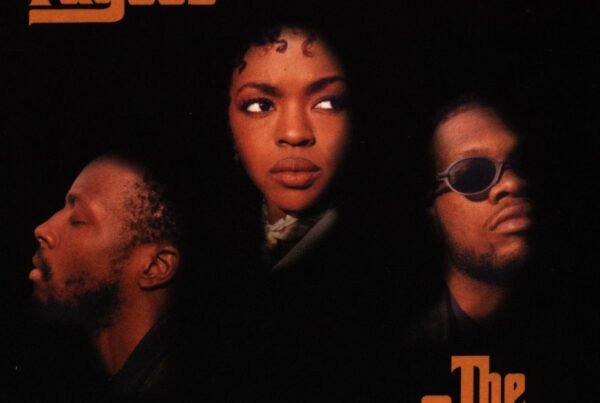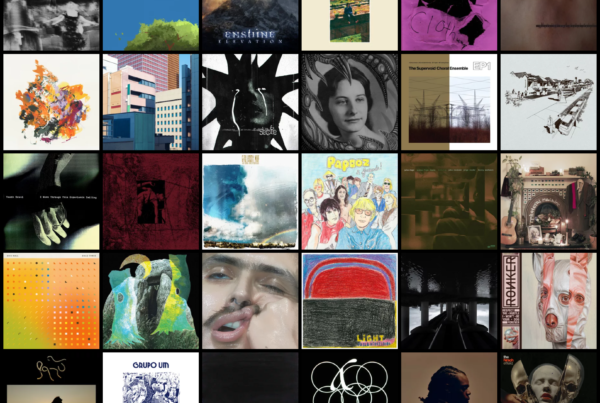Release date: April 20, 1998 | Virgin/Circa | Facebook | Instagram | Website
Some records define a movement, others a whole period of time. Some records might even dominate the zeitgeist for years to come, or at least fester in the subconscious of pop culture’s collective memory for a long, long time. I’m not even sure in which of these categories to place Massive Attack‘s massive (pun wholeheartedly intended) third album Mezzanine; perhaps it’s too fitting for all of them to reduce it to one kind of impact. Be it as it may, this gargantuan, widely acclaimed and influential recording was released 25 years ago by now, which makes it inevitable that it would appear on A Scene In Retrospect around this time.
Joe McKenna
The year is 1998, the English city of Bristol is facing a period of immense cultural change the likes this Southern West city has ever seen. After an assimilation of soul, reggae, dub, and hip hop being dispersed across Bristol’s mid-’80s club scene, many of these transatlantic samples and sounds that found their way into sound systems of creatively stimulated DJs and audio engineers. Cue Massive Attack, often coined under the ‘trip-hop’ genre tagline, this west country electronic collective embodied a degree of style and aesthetic that was far too sonically expansive to fall under one particular genre. This, of course, cannot be clearer for the group than on their third studio release, Mezzanine.
At a time when Massive Attack became somewhat a voice for an entire youth subculture disillusioned by the turmoil of the Thatcher years a decade prior; the false hope given by a new Labour government; and general the declining socio-political landscape that plagued their future, their music had always strived to distance from other forms of dance music within the Bristol scene to convey a more socially-conscious message, yet it was with Mezzanine that the band truly augmented their rebellious outsider status within the dance scene that consisted of an unorthodox sonic palette that pushed experimentation with new aesthetic territories personifying notions of punk rock and industrial on top of hip hop and dub music.
I’ve always gravitated towards sounds that exude a dark and sinister tone, as they tend to be most successful in holding my intrigue for the mysterious and confrontational concepts that are buried within them; to find that in Mezzanine, however, was an entire new feeling that I still can’t quite describe so clearly. The overall tone needed not be too heavy, too extreme, too socially objective, too controversial for it to still evoke a darker aesthetic; rather the songs on this album are more concerned with exploring numerous outlandish musical realms that formulate it’s atmosphere. Take “Inertia Creeps” as an example of this carefully woven web of chilling beats that interlace with several abnormal textures to create this unstable sensation.
“Dissolved Girl” was another one of these darker tracks I found myself attached to, due to its enigmatic sonic qualities that somewhat radiated a sort of warm energy at the same time, when you take the dissident electronic patterns and distorted, mechanised punk riffs whilst Shara Nelson’s icy vocal delivery adds a layer of mystique to the piece. Another personal favourite, and what I think is one of the record’s more distinguished tracks, “Teardrop” combines layers of tense melodramatic harmony, melodic plucks, and entrancing electro-beats to formulate an enchanting soundscape that allows you to fall into an otherworldly hole of mystery.
Another interesting aspect of this record I never really looked too much into the first time around, and what I’ve been most drawn to whilst writing this piece, is the heavily nuanced and intricate use of samples that are dispersed across many of Mezzanine’s tracks. These samples are pretty evident of Massive Attack’s roots in reggae, punk, industrial, dub, and even folk music, particularly in the song “Risingson” that makes lyrical reference to “Dennis the Menace” (Dennis Pinnock), “I Found a Reason” (The Velvet Underground), and “Where Have All The Flowers Gone” (Pete Seegar), truly showing exceptionally high degree of musical diversity and nuance. The fact that the band were able to include a list of samples that expands over from ’60s/’70s Caribbean rocksteady innovators to notorious hard rock contemporaries just goes to demonstrate the driving ambition and creative exchange that was present within Massive Attack’s musicianship at this time.
I could go on about wide assortment of artists and songs being used within the Mezzanine repertoire, but since there’s plenty of videos and analysis of that already for you to really dig into, there’s not much more left to say about this strangely unique and quite mesmerising record, other than maybe arguing that this is one of those albums that stands out for its day not just because of how it created something that stood it apart from other electronic and trip hop music that was being produced around the same time, but also because Mezzanine is one of those records that contains so much sonic multiplicity that its able to draw listeners in from very contrasted music backgrounds and embrace this opaque, dystopian, post-apocalyptic record first-hand.
Hanna Ott
With how involved in music all of us here at EIN are, I’m sure we all find it hard to believe sometimes that there was a time when music didn’t mean much to us at all. For some of us, it may be so far back that we can’t remember; for others, it may still be quite recent. My parents aren’t musical, but they did listen to a lot of music while they worked, cooked, and ate, so I absorbed a fair bit growing up. Music has always been a part of my life, but it was quite a passive love for a while.
When I was 5, a relative or family friend gave me a recorder and a simplified book of songs, where each note corresponded to a colour. I don’t know who it was or why they thought I’d like it – maybe they had guessed I’d be into it, or they really had a vendetta against my parents. In any case, I was all about it, soon progressed to recorder lessons with real sheet music, and discovered I had a knack. But the first time I remember actually hearing music wasn’t until quite a bit later, perhaps when I was 10 or 11, in music class, and we were learning about Queen, The Beatles, Elvis. I loved singing at school assemblies, and I adored Queen. I quickly got into whatever rock was on my parents’ CD shelf – the catchier, the better. And yet, I don’t believe I ever truly listened to music until I heard Massive Attack’s Heligoland.
Now, I’ll be the first to admit that my memory is not the greatest, but there are some things I remember so clearly. While I couldn’t tell you exactly where I was or what was going on at the time, I distinctly recall how I felt the first time I heard that album. From the opening track, “Pray For Rain”, I knew this was different, special. This seemed like a different world, an entirely different league, from the classic rock I’d grown fond of. I felt myself turn inward, somehow, become engulfed in the music; I felt it was filling me up, holding me. I was on the precipice of puberty at the time, beginning to understand the complexity and pain of existence, but not yet distracted by hormones or in the habit of overanalysing my own emotions. It was, quite simply, transformative. I seriously believe that, along with Gotan Project and Portishead, Massive Attack not only opened my ears to alternative music, but also played a huge part in my developing a taste for darker songs and interesting sounds.
I didn’t hear Massive Attack’s seminal Mezzanine in full until a year or two ago, but I heard bits and pieces from it. My parents have a good friend who has a house in the barren centre of New Zealand’s south island. We stayed there for perhaps a week when I was maybe 15; I’d just started listening to metal. I remember the days were filled with walks through the desolate hills, sheep skeletons, and dead rabbits. In the evenings, the adults would sit around discussing politics, drinking wine, and listening to music. Our family friend, knowing I was getting a taste for the darker side of music, played me “Inertia Creeps”. I remember it felt somehow strange, this clean, electronic, introspective music in the landscape of hot, dusty, death-filled days, and yet it matched, somehow.
I became increasingly fascinated with trip hop, and Massive Attack specifically. It wasn’t just the songs that got to me, it was everything – the way the instruments sounded, the way the parts were layered, the lyrics (one of my favourites, from “Flat of the Blade”: ‘I’m not good in a crowd/I’ve got skills I can’t speak of/Things I’ve seen will chase me to the grave’). Haunting, delicate but deliberate, always – and so bleakly beautiful. The way Massive Attack utilise guest vocalists for their unique timbres, their wildly distinct ways of phrasing sentences, their own individual melodies – it’s always blown my mind.
Massive Attack was always with me from that point on, not always actively, but always as a band that I held in high esteem even when I wasn’t listening to them regularly. “Inertia Creeps” is still one of my absolute favourite songs by them – there are so many contrasting textures on it, all the percussive elements, the pulsating synths, warbling Middle Eastern style strings, the guitars (jangly on the left and heavily distorted on the right), the super intimate, dry vocals – it should be so overwhelming, but it’s not. It demands attention, is transfixing, captivating; I find it damn near impossible to do anything when this song is playing, other than listen.
All of Massive Attack’s music, but especially Mezzanine, has this absolutely incredible vibe about it. I feel like it exists only in my head, and yet is coming from everywhere at once; a whole world in itself, an abstract dream verging on a nightmare, a soundtrack to my life. That’s especially prominent on “Inertia Creeps”, but also “Risingson”, which, despite or maybe because of its simplicity, has the power to turn even the sunniest days into some sort of noir cinematic experience. As a whole, Mezzanine is mesmerising, glacial, and immense, and yet each track stands on its own, too.
The suspended haze of opening track “Angel”, with its deep, rumbling bass and crisp drums shrouded in layers of synths, sets the tone for much of Mezzanine – dystopian, structured, but somehow not rigid, throbbing, grinding, twisting, heaving, some sort of half-robot creature on the prowl. A beauty to behold, yet supremely dark, and often verging on threatening, or at the very least, deeply unsettling.
Mezzanine isn’t a perfect album to me, though it is very good. My partner’s brother moved in with us for a few years, and he was hugely into Massive Attack – he adored them. In particular, he had a fondness for “Teardrop”, and would often talk about it or play it while we were sitting around listening to jams. Through overexposure, I became a bit disinterested in this track after a while, even though there’s a lot to love about it (I challenge anyone to find a cooler use of harpsichord on a contemporary song!). The tape crackle is also just perfect. I’ve never liked the lyrics though – mainly the fact that such a beautiful song can start with such weak opening lines: ‘Love, love is a verb/Love is a doing word’ – I didn’t come here to learn about grammar, thanks. Maybe I’m being facetious.
Musically, I think the song is nice, and Elizabeth Fraser’s vocals on it certainly set it apart from everything that’s happened before, but I think it’s relentlessly overhyped, especially when compared with the spectacularly underrated “Dissolved Girl” – probably the grittiest and heaviest song on the album, and a personal favourite. The purity and delicacy of Sara Jay Hawley’s voice offers a lovely and disconcerting contrast to the dark, brooding, volatile musical landscape it floats over. The lyrics, too, are beautiful in their simplistic self-deprecation, and relatable beyond a doubt. It all speaks to me, but I especially like the lines ‘I could fake it/But I’d still want more’ and the very sober ‘Passion’s overrated anyway’. Great track, and a wonderful return to the festering darkness of the first half of the album after the brief respite of “Exchange”.
Mezzanine is an album that just keeps going; the atmosphere is consistent, yet it never becomes stale. Shout out here to the title track, probably my personal favourite from the second half, though it seems unfair to talk about it without mentioning “Group Four”, its partner in crime. Unmatched in bleak nightmarishness, both of these songs are works of art, so specifically constructed, and the production on them is to die for. Every sound, every sample, every tone has been manipulated to terrifying perfection – they’re chilling, simultaneously spacious and claustrophobic. It’s like Massive Attack are slowly crumbling in perfect disharmony, driven insane by what they have created on Mezzanine.
Massive Attack are an occasional treat for me – I’m not always in the mood, but when I am, nothing else will do. Writing this article has certainly reminded me of everything that’s so great about them – I think I might be about to start a bit of a binge. I’m looking forward to it – bring it on.






